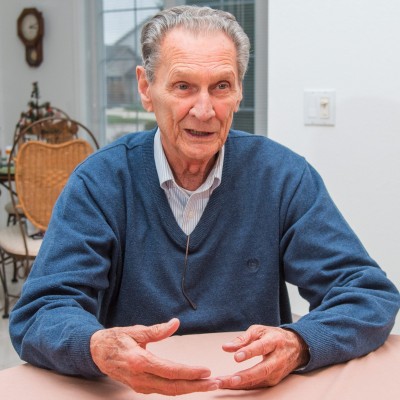Jim Voyles
By Paul Wood

Photo By Rick Danzl
Rick Danzl/The News-Gazette James Voyles at Parkland College in Champaign on Wednesday Oct. 9, 2019, served near the Cambodian border in the Vietnam War.
TUSCOLA — In the Vietnam jungle, Jim Voyles might have been within 50 feet of the enemy and not seen him through the brush and bamboo.
His soldiers spoke in hushed tones and were careful about cooking food with strong odors.
The Parkland College board member, now 72, was an Army artillery forward observer. Among his many medals was the Bronze Star with V device.
He grew up in Virden in southern Illinois. At Murray State University in Kentucky, he had the mandatory two years in ROTC, which led to a commission as an officer in the Army. He became a second lieutenant in the artillery.
In Vietnam in 1970, he was assigned to Charlie Company in the 1st Cavalry, actually infantry rather than artillery. But as a forward observer, he directed a rain of metal (often from helicopter gunships) on North Vietnam regulars.
Voyles would spend 21 to 28 days at a time in the jungle.
“Every four or five days, a helicopter would come by with supplies,” he said.
Things like bathing were impossible. “You could smell perfumed soap” in the rotting jungle, he said.
Forward observers, like you’d expect being anything forward in a jungle, put a target on your head.
“They try to kill the company commander first. The forward observer was second,” Voyles said.
It was his job to know exactly where his unit was, with the help of a compass and topographic map. Being mistaken could cause his own troops to face friendly fire.
You had to know the terrain, he said, because the maps were not always trustworthy.
A Huey dropped off the men in the jungle. Two radio men and a reconnaissance specialist were part of the team.
That’s where he’d coordinate with other units.
One radio call told him “you say you’re in one place, the company commander says you’re in a different place.”
“We fired a marking round,” Voyles recalled. “It popped right over us.”
Some officers preferred walking on trails because they wouldn’t make noise by breaking branches. An NVA soldier could be close by.
Once, an NVA soldier tossed a grenade at them, but it didn’t go off.
Near the Cambodian border, the Ho Chi Minh Trail was extensive — used by the communists to move equipment and food, so they weren’t booby-trapped.
When the forward observer called in a gunship, the nature of the area removed one of Voyles’ concerns.
“There were no villages in that part of Cambodia,” he said, hence no non-combatants to accidentally kill or maim. “I could light up a valley with artillery.”
Soldiers found a lot of the supplies that were meant for North Vietnam.
“We called it Rock Island East,” he said. (Illinois’ Rock Island Arsenal is the largest government-owned weapons manufacturing arsenal in the U.S.)
They sampled cans of Vietnamese food but were put off immediately by what smelled like rotting cabbage.
Most troops were airlifted from the danger zone; Charlie Company walked out, Voyles said.
That was dangerous when the soldiers couldn’t see North Vietnamese regulars.
They weren’t as concerned about the Viet Cong, whom they thought of as amateurs.
“Automatic weapons tend to head up” and over the heads of his soldiers. “The regulars knew to shoot low,” Voyles said.
He was injured when he had to jump out of a helicopter into elephant grass. His left leg was injured, and medics tried to treat an infection.
Finally, he was medevaced to Japan and then to Fort Leonard Wood in Missouri. After surgery, he’d lost 30 pounds.
Voyles earned advanced degrees from Western Illinois, where he met his wife; the University of Illinois-Springfield; and Eastern Illinois.
His distinguished career in education included becoming principal of Tuscola High, then the district’s superintendent of schools for 15 years. After retiring, he served as interim superintendent of Villa Grove schools and made a final return as interim superintendent in Tuscola.
Read more stories from local veterans:
 Mike Sandone
URBANA — About 22 military veterans commit suicide every day. Marine Sgt. Mike Sandone, 40, is a physical fitness expert …
Mike Sandone
URBANA — About 22 military veterans commit suicide every day. Marine Sgt. Mike Sandone, 40, is a physical fitness expert …
 Wayne Roosevelt
MAHOMET — Wayne Roosevelt relived a lot of memories when he helped put up The Wall That Heals in his town earlier this y …
Wayne Roosevelt
MAHOMET — Wayne Roosevelt relived a lot of memories when he helped put up The Wall That Heals in his town earlier this y …
 Melvin Parker
CHAMPAIGN — Melvin Parker joined the Army right after World War II, when it looked like there might be war with the Sovi …
Melvin Parker
CHAMPAIGN — Melvin Parker joined the Army right after World War II, when it looked like there might be war with the Sovi …